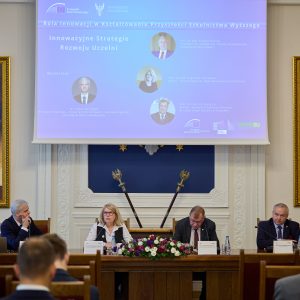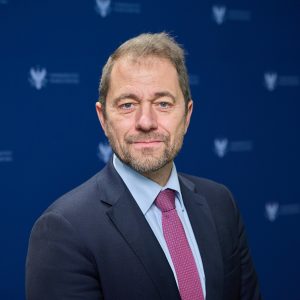“The European Investment Bank is an important partner of the University of Warsaw and all Polish universities. It is an institution that supports the development of higher education, innovation and new technologies,” said Prof. Alojzy Z. Nowak, the UW Rector, opening a conference on the role of innovation in shaping the future of higher education. The event took place on 16th October in the Senate Hall of the Casimir Palace.
The conference was co-organised by the European Investment Bank (EIB). Prof. Alojzy Z. Nowak, the UW Rector, emphasised the importance of the support provided by the EIB and similar institutions, including financial support, which constitutes an additional source of capital for the development of innovation, new technologies and scientific research.
“National expenditure on science and higher education is insufficient to fully implement the strategies of Polish universities. Hence the need to seek additional sources of funding for our activities. We are talking, for example, about funds from the National Recovery Plan, but also about support from the European Investment Bank,” said the Rector, adding: “We are also discussing the creation of a so-called subsidy system, but this is not easy due to the need for equity capital. In the case of the UW, we are talking about at least PLN 10 billion. We need ongoing dialogue with financial institutions, the government and the Ministry of Science and Higher Education.”
The European Investment Bank actively supports innovation, digitisation and human capital development, including the modernisation and innovation of universities and research institutes in Poland, through among others the TechEU programme. During the meeting at the UW, rectors and representatives of the authorities of 20 leading Polish public universities had the opportunity to learn about the latest offer from the European Union’s development bank in terms of supporting innovation in universities and science.
“Modern higher education and ground-breaking research are the driving force behind social and economic development. The aim of the EIB Group’s support for Polish universities as well as scientific and research staff is to stimulate growth in innovation and economic competitiveness, which is what our TechEU programme is designed to do. Close cooperation between universities and business is key to the dynamic development of a knowledge-based economy,” says Prof. Teresa Czerwińska, Vice-President of the EIB.
“The science and higher education sector is very important to us, not least because it can make the single European market more competitive in the long term. Research results are often also key to building greater resilience in societies in today’s uncertain times,” said Gilles Badot, Director of the EIB’s Public Sector Lending Department.
Prof. Dominik Antonowicz, head of the Department of Science and Higher Education Research at Nicolaus Copernicus University in Toruń, gave a lecture during the conference. The researcher spoke about the changes taking place in higher education and scientific research in the EU and their consequences for the sector in the coming years. He mentioned that in the future, the student population at universities will be increasingly older, and forms of education will evolve towards shorter, modular blocks. He added that universities are already facing the phenomenon of drop-outs, i.e. students leaving university before obtaining a degree.
Prof. Antonowicz presented three possible scenarios for the development of the higher education and science sector. The first assumes that universities will be able to change from the bottom up and convince the government that they will adapt to new social and economic expectations. In the second, university funding will remain stable but low, and higher education institutions will struggle with a constant lack of funds, unable to attract talent and cope with successive crises. According to the third scenario, alternatives to traditional universities will emerge in the future – institutions that will be more effective at attracting students, educating them better and conducting more interesting research.
Innovative strategies for university development
Four panel sessions were held during the conference. The participants of the first session were Prof. Sambor Grucza, the UW Vice-Rector for Cooperation and Human Affairs, Prof. Jerzy Lis, Rector of the Stanisław Staszic Mining and Metallurgical Academy in Kraków (AGH), and Prof. Bogumiła Kaniewska, Rector of the Adam Mickiewicz University in Poznań (UAM). The discussion was moderated by Dr Sebastian Hyżyk, Head of Division in the EIB’s Innovation and Competitiveness Department.
Prof. Kaniewska emphasised that, in her opinion, one of the most important strategic activities at UAM is the grassroots movement initiated by dean’s office employees – Forum Dziekanatów (ENG: Dean’s Office Forum), operating throughout Poland, as well as the Forum Administracji (ENG: Administration Forum).
“The entire administration has moved from a supporting, auxiliary position to an innovative, inspiring position, taking the initiative and assuming responsibility for the university. This creates an interesting synergy that allows the university to be treated as a whole,” said the Rector of UAM.
Prof. Jerzy Lis mentioned the construction of a “second” university structure, which integrated various research centres.
“We completely rejected the proposal to divide the university into disciplines. Interdepartmental centres – energy, cyber security, space technology, nanomaterials – coordinate activities within certain areas of science. These are places where huge projects and innovations are carried out. This has enabled a high degree of flexibility,” said the Rector of AGH.
Prof. Sambor Grucza emphasised the role of three aspects in the development of the university: digitisation, improving employee skills and European university alliances – in the case of the University of Warsaw, this refers to the 4EU+ Alliance. He spoke about electronic document circulation, e-files for employees, electronic signatures and training programmes, including Akademia Dziekanów (ENG: the Academy of Deans) and Akademia Liderów (ENG: the Academy of Leaders).
“The European Universities initiative has created a large field for innovation. Among other things, we have a joint online platform offering courses for students and doctoral candidates. The first steps have also been taken towards the possibility of issuing joint diplomas within the European Union,” said Prof. Grucza.
Smart campuses
The second panel session focused on the ways of using technology to create better educational spaces. The debate, moderated by Teodora Tataru from the EIB, was attended by Prof. Ewa Krogulec, the UW Vice-Rector for Development, Ulla Nykter from the EIB’s Innovation and Competitiveness Department, and Tom Boland, an expert on international education.
“As we begin our discussion on smart campuses, I think of the University as an entire ecosystem consisting of research, teaching and management systems. We see the concept of a smart campus at the UW as a key part of sustainable development. We want our space to be more efficient, green and inclusive. The UW’s strategy for 2023–2032 clearly links innovation with sustainable development,” said Prof. Krogulec.
New financing models
The last two sessions of the conference were devoted to financing models for university projects and investments in higher education.
Robert Grey, the UW Chancellor, Prof. Zbigniew Pastuszak, Vice-Rector for Development and Business Cooperation at Maria Curie-Skłodowska University in Lublin, and Paweł Paszczyk, an expert on higher education financing at the EIB, discussed overcoming barriers, effective financing models, creative partnerships and the role of consulting. The discussion was moderated by Prof. Dominik Antonowicz.
“Today’s universities need not only financial resources, but also the courage and flexibility to embrace new models of cooperation with the public and private sectors. Innovative financing is becoming a key tool for the development of universities, both in terms of infrastructure and scientific research and teaching. New financing models in higher education are primarily a way of thinking about management and investing in the future. In order to meet the challenges of today, we must skilfully combine various sources of capital – public, European, private and philanthropic – which will ensure the stability and resilience of universities to change,” said the UW Chancellor.
Tom Boland presented an EU-wide overview of higher education investment (CAPEX) funding models. The presentation analysed public sources of funding, available external funding (research contracts, EU funds, philanthropic sources, etc.), internal sources of income (tuition fees, student fees, other income-generating activities), performance-based funding, and examples of innovative financing methods.



























